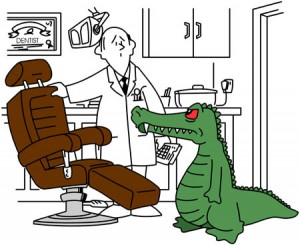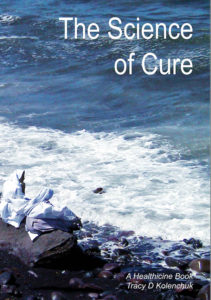 “Ok,” says Alice “I understand that we both have healthy teeth – according to our dentists – and I understand that we don’t know which of us has the healthiest teeth. But what about fluoride, doesn’t it make our teeth healthier?”
“Ok,” says Alice “I understand that we both have healthy teeth – according to our dentists – and I understand that we don’t know which of us has the healthiest teeth. But what about fluoride, doesn’t it make our teeth healthier?”
“You use fluoride?” asked Zizi.
“Of course I do. It’s in the water, it’s in the toothpaste and when I go to the dentist – it’s impossible to avoid fluoride.”
“I don’t use fluoride” Zizi responds. “I don’t believe it’s healthy. It’s difficult, but not impossible to avoid it. I value my health and my health freedom.” I tell my dentist – no fluoride on my teeth.
“I can understand that fluoride treatments are a bit like ‘painting’ or ‘bleaching’ my teeth, so maybe they don’t “grow healthiness”, but what about fluoride in the water? Doesn’t that help our teeth to grow healthier?”
“To tell the truth, no one has tested if fluoride makes our teeth healthier. There have been a few tests to measure if it decreases illness, but none that measure healthiness,” Zizi responds, “The original study was very short and limited – it only tested incidence of caries or cavities, and then governments decided to put fluoride in the water.”
“Wasn’t there a big ‘meta-study’ in Australia a few years back?” asked Alice.
“Yes, the famous Melbourne meta-study. It has quite a title ‘Review of Water Fluoridation and Fluoride Intake from Discretionary Fluoride Supplements‘ and quite an ambition: ‘to gather and evaluate the scientific evidence since 1990 in relation to the health effects of fluoridated water and fluoride from other sources’. But they didn’t understand their mission statement.”
“What do you mean, ‘they didn’t understand” asked Alice.
“Their mission statement said ‘in relation to health effects‘, but they only studied illness effects. They didn’t study any health effects,” Zizi explained. “They studied caries, a disease of the teeth. They studied research into fluorosis and enamel defects, a disease of the teeth caused by excessive fluoride. They studied bone mineral density and fractures and osteoporosis. They studied fluoride as it relates to bone cancer and other cancers, as well as reproductive toxicity, gastro-intestinal toxicity, and hearing defects. They studied cases where water fluoridation systems have failed, poisoning a small town and killing at least one person. They even have a complete section with the title ‘FLUORIDE – HEALTH EFFECTS’, where they reference many other research studies, but the research only talks about caries. There is no attempt to measure tooth healthiness, only tooth illness.”
“What about fluoride toothpaste,” asked Alice. “Every toothpaste has fluoride, surely there have been studies into the health of fluoride in toothpastes.”
“Not! The Melbourne study reported that ‘No randomised controlled fluoride toothpaste studies used negative controls.‘ As near as they could determine, there was no research evidence that fluoride toothpaste reduced caries. Research studies had concluded ‘weak but not significant caries benefit’, and ‘no difference in caries’, to ‘a 26 percent decrease.. using a modified toothpaste technique which increased contact with the teeth.’ No studies measured fluoride toothpaste vs non-fluoride toothpaste. No studies measured the healthiness of teeth – only the illness of teeth.”
She continued, “Their final conclusions are no less confusing, the first is ‘Significant benefits in preventing dental caries in deciduous teeth from water fluoridation.‘, but the last says ‘Increased caries demonstrated in those with higher fluorosis scores. Increased dental caries in children with calcium deficiency and high water fluoride intake.‘ Duh. It’s clear that, without studies of healthiness, with just the studies of illness – the result is nonsense. A half truth, the sick half truth, and nothing but the sick half.”
“You mentioned osteoporosis,” Alice interrupted, “Does fluoride create stronger bones as well as stronger teeth?”
“According to the Melbourne study, ‘evidence of the benefit of fluoride in the treatment of osteoporosis is inconclusive’. It appears that fluoride increases bone density, but that the increased bone density is weaker – so at best it’s a wash. Of course it might be true that fluoride makes your bones less healthy – but no-one has tried to measure healthiness of bones.” Zizi waved her hand.
“So what doe fluoride actually do?” asked Alice.
“It sells toothpaste. That’s the only thing we can be sure of,” replied Zizi.
“of which we can be sure” corrected Alice. “That’s really complicated… But what did the Melbourne actually recommend?”
“That’s the most confusing part,” Zizi sighed. “They list 5 different ways to reduce fluoride consumption in the section called FLUORIDE – HEALTH EFFECTS. And two more ways to reduce fluoride consumption in the next section where they discuss the ‘rising incidence of fluorosis. Then they delivered a two part message. part 1: continue to fluoridate water supplies, part 2: avoid excessive intake of fluoride from other sources. They close with the traditional butt-covering qualifier: ‘However, this requires monitoring and more purposeful research.’ ”
“Has anyone actually studied how to actually make teeth healthier?” asked Alice.
“Weston Price did some very interesting research by documenting dental health in many countries and communities. His conclusion was that nutrition was a much larger factor than bacteria or brushing. And Ramiel Nagel, did lots of research into the works of Weston Price and others – and wrote a book called ‘Cure Tooth Decay’, it’s an interesting book, but not well accepted by medical science nor dentist associations.”
“Why not?” asked Alice.
“There are probably many reasons. First, it’s not a pretty book. There are lots of black and white photos of good and bad teeth. It’s not aimed at dentists, it’s aimed at normal people who want to make their teeth healthier. But perhaps most important – there is no science of dental healthiness,” Zizi replied.
“No science of dental healthiness?”
“There are many people studying dental illness – drilling holes, developing new fillings and glues, pulling teeth with minimal pain, dental surgery, braces to force teeth to grow straighter, extractions to make room for large teeth in a small jaw, etc., but no one studies dental health seriously. Also, it’s difficult to ‘market’ dental health. Much easier to market toothpastes, dental floss, bleaching and other cosmetic applications. You can get instant results by bleaching your teeth – but you might not notice if you make them healthier,” said Alice. She continued, “Actually, there is some science, but it is largely ignored by the dental profession. The Weston A Price foundation has lots of research into healthy teeth and much of that research was used by Ramiel Nagel as he write ‘Cure Tooth Decay’. Dr. Ralph Steinman’s research demonstrated that bacteria does not cause tooth decay, that glands in the jaw send messages to mineralize or demineralize the teeth. But this research is pretty much ignored – even though Dr Steinman, a Canadian, won a Nobel Prize in medicine for some of his other work. But, his research doesn’t help market toothpastes and mouthwash, so you’ve probably never heard of it. And neither has your dentist.”
“Well then,” asked Alice, “why should I want to make my teeth healthier?”
“Healthy teeth last longer, truly get fewer cavities, and can heal when small problems arise. Can you imagine if you cut your finger and the surgeon said ‘the best plan is to cut out a larger area so we remove all of the damaged flesh, and then we will glue in a patch of plastic skin replacement’? That’s what dental fillings do. If you visit you dentist regularly, they can often see the caries BEFORE they become a cavities. Dentist know that caries can heal, but they don’t study how they heal. They study ‘dental surgery’, not ‘tooth health’. Dentists often make tooth health worse, not better. Dentists treatments are designed to stop pain. But healthy teeth, and healing teeth is the most effective way to stop dental pain,” Zizi summarized.
“So,” asked Alice, “which of us has the healthier teeth?”
“Our dentists can’t tell us,” replied Zizi, “but, I can.”
—————————————————————–
You can learn more about the health of Alice and Zizi in these posts:
The Health Test: Alice and Zizi – Part 1: Who is the healthiest?
The Health Test: Alice and Zizi – Part 2 The Common Cold
The Health Test: Alice and Zizi – Part 3 The Immune System
Zizi Gets a Cold, Or Not?
The Health Test: Alice and Zizi – Part 5 The Flu
Alice and Zizi part 6: A visit to the Dentist – Whose Teeth are the Healthiest?



Pingback: The Health Test: Alice and Zizi – Part 1: Who is the healthiest? | Healthicine
http://www.fluoride-class-action.com/sham